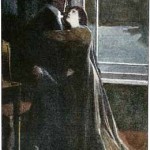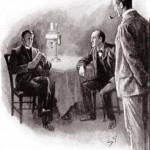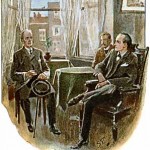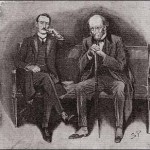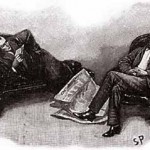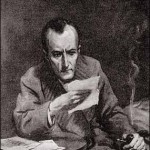Sherlock Holmes was in a melancholy and philosophic mood that morning. His alert practical nature was subject to such reactions.
“Did you see him?” he asked.
“You mean the old fellow who has just gone out?”
“Precisely.”
“Yes, I met him at the door.”
“What did you think of him?”
“A pathetic, futile, broken creature.”
“Exactly, Watson. Pathetic and futile. But is not all life pathetic and futile? Is not his story a microcosm of the whole? We reach. We grasp. And what is left in our hands at the end? A shadow. Or worse than a shadow–misery.”
“Is he one of your clients?”
“Well, I suppose I may call him so. He has been sent on by the Yard. Just as medical men occasionally send their incurables to a quack. They argue that they can do nothing more, and that whatever happens the patient can be no worse than he is.”
“What is the matter?”
Holmes took a rather soiled card from the table. “Josiah Amberley. He says he was junior partner of Brickfall and Amberley, who are manufacturers of artistic materials. You will see their names upon paint-boxes. He made his little pile, retired from business at the age of sixty-one, bought a house at Lewisham. and settled down to rest after a life of ceaseless grind. One would think his future was tolerably assured.”
“Yes, indeed.”
Holmes glanced over some notes which he had scribbled upon the back of an envelope.
“Retired in 1896, Watson. Early in 1897 he married a woman twenty years younger than himself–a good-looking woman, too. if the photograph does not flatter. A competence, a wife, leisure–it seemed a straight road which lay before him. And yet within two years he is, as you have seen, as broken and miserable a creature as crawls beneath the sun.”
“But what has happened?”
“The old story, Watson. A treacherous friend and a fickle wife. It would appear that Amberley has one hobby in life, and it is chess. Not far from him at Lewisham there lives a young doctor who is also a chess-player. I have noted his name as Dr. Ray Ernest. Ernest was frequently in the house, and an intimacy between him and Mrs. Amberley was a natural sequence, for you must admit that our unfortunate client has few outward graces, whatever his inner virtues may be. The couple went off together last week–destination untraced. What is more, the faithless spouse carried off the old man’s deed-box as her personal luggage with a good part of his life’s savings within. Can we find the lady? Can we save the money? A commonplace problem so far as it has developed, and yet a vital one for Josiah Amberley.”
“What will you do about it?”
“Well, the immediate question, my dear Watson, happens to be, What will you do?–if you will be good enough to understudy me. You know that I am preoccupied with this case of the two Coptic Patriarchs, which should come to a head to-day. I really have not time to go out to Lewisham, and yet evidence taken on the spot has a special value. The old fellow was quite insistent that I should go, but I explained my difficulty. He is prepared to meet a representative.”
“By all means,” I answered. “I confess I don’t see that I can be of much service, but I am willing to do my best.” And so it was that on a summer afternoon I set forth to Lewisham, little dreaming that within a week the affair in which I was engaging would be the eager debate of all England.
It was late that evening before I returned to Baker Street and gave an account of my mission. Holmes lay with his gaunt figure stretched in his deep chair, his pipe curling forth slow wreaths of acrid tobacco, while his eyelids drooped over his eyes so lazily that he might almost have been asleep were it not that at any halt or questionable passage of my narrative they half lifted, and two gray eyes, as bright and keen as rapiers, transfixed me with their searching glance.
“The Haven is the name of Mr. Josiah Amberley’s house,” I explained. “I think it would interest you, Holmes. It is like some penurious patrician who has sunk into the company of his inferiors. You know that particular quarter, the monotonous brick streets, the weary suburban highways. Right in the middle of them, a little island of ancient culture and comfort, lies this old home, surrounded by a high sun-baked wall mottled with lichens and topped with moss, the sort of wall–”
“Cut out the poetry, Watson,” said Holmes severely. “I note that it was a high brick wall.”
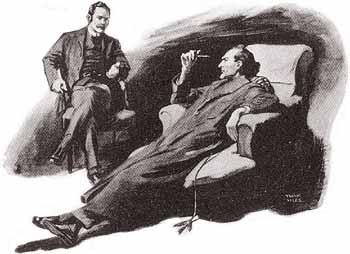
“Exactly. I should not have known which was The Haven had I not asked a lounger who was smoking in the street. I have a reason for mentioning him. He was a tall, dark, heavily moustached, rather military-looking man. He nodded in answer to my inquiry and gave me a curiously questioning glance, which came back to my memory a little later.
“I had hardly entered the gateway before I saw Mr. Amberley coming down the drive. I only had a glimpse of him this morning, and he certainly gave me the impression of a strange creature, but when I saw him in full light his appearance was even more abnormal.”
“I have, of course, studied it, and yet I should be interested to have your impression,” said Holmes.
“He seemed to me like a man who was literally bowed down by care. His back was curved as though he carried a heavy burden. Yet he was not the weakling that I had at first imagined, for his shoulders and chest have the framework of a giant, though his figure tapers away into a pair of spindled legs.”
“Left shoe wrinkled, right one smooth.”
“I did not observe that.”
“No, you wouldn’t. I spotted his artificial limb. But proceed.”
“I was struck by the snaky locks of grizzled hair which curled from under his old straw hat, and his face with its fierce, eager expression and the deeply lined features.”
“Very good, Watson. What did he say?”

